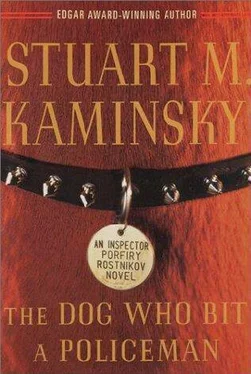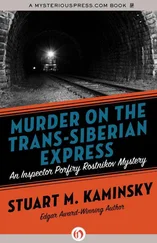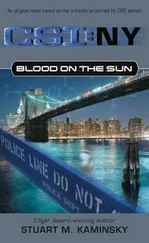Stuart Kaminsky - The Dog Who Bit a Policeman
Здесь есть возможность читать онлайн «Stuart Kaminsky - The Dog Who Bit a Policeman» весь текст электронной книги совершенно бесплатно (целиком полную версию без сокращений). В некоторых случаях можно слушать аудио, скачать через торрент в формате fb2 и присутствует краткое содержание. Жанр: Полицейский детектив, на русском языке. Описание произведения, (предисловие) а так же отзывы посетителей доступны на портале библиотеки ЛибКат.
- Название:The Dog Who Bit a Policeman
- Автор:
- Жанр:
- Год:неизвестен
- ISBN:нет данных
- Рейтинг книги:3 / 5. Голосов: 1
-
Избранное:Добавить в избранное
- Отзывы:
-
Ваша оценка:
- 60
- 1
- 2
- 3
- 4
- 5
The Dog Who Bit a Policeman: краткое содержание, описание и аннотация
Предлагаем к чтению аннотацию, описание, краткое содержание или предисловие (зависит от того, что написал сам автор книги «The Dog Who Bit a Policeman»). Если вы не нашли необходимую информацию о книге — напишите в комментариях, мы постараемся отыскать её.
The Dog Who Bit a Policeman — читать онлайн бесплатно полную книгу (весь текст) целиком
Ниже представлен текст книги, разбитый по страницам. Система сохранения места последней прочитанной страницы, позволяет с удобством читать онлайн бесплатно книгу «The Dog Who Bit a Policeman», без необходимости каждый раз заново искать на чём Вы остановились. Поставьте закладку, и сможете в любой момент перейти на страницу, на которой закончили чтение.
Интервал:
Закладка:
“Take her away,” said Rostnikov to Emil Karpo.
Karpo took Raisa’s arm and led her, clutching her brown envelope, toward the entrance to the cemetery.
“Disperse,” the policeman said, trying to keep his voice steady.
The two gangs hesitated. Could they back off and retain their honor? Who was the primary enemy here? The gang on the other side of the grave or the armed policemen?
Rostnikov strode forward, allowing himself a bit more of a limp than was really necessary. It was not sympathy he sought, but time.
“I was up before dawn,” he said aloud, stepping alongside of the policemen. “Couldn’t sleep. Too much to think about, too many problems, and the intricacies of a particularly puzzling plumbing system haunted my dreams. I couldn’t make the system go away.
My dream eye followed rusting pipes moving ever faster in a maze I knew had no end.”
“You have a point to make, Rostnikov?” called Shatalov.
“I was up very early. I believe I said that. I put on my leg and my clothes and took the rare step of calling for a police car. It is a benefit of my position which I rarely use. But this time I wanted to get to this cemetery to watch the sun rise over the tombstones.”
Chenko, with his single eye, and Shatalov, with his two alcohol red eyes, glared at each other in anticipation of what was coming next.
“I did some cleaning up of weeds that had been planted here last night,” said Rostnikov. “I wish I had been here to witness this gardening, and I must say I’m surprised that the two sets of garden-ers did not run into each other. Perhaps the night was long for them as well as for me. In short, gentlemen, the weapons you hid under thin layers of dirt and leaves and in the low limbs of trees nearby are no longer there. I have had then taken away to be dis-tributed to the needy. There are petty thieves and armed robbers who can afford little more than small knives and ancient pistols.”
Rostnikov paused and stepped out of the way of the policemen’s guns.
“That was an attempt at mild humor,” said Rostnikov. “An attempt to diffuse a situation that will bring nothing good to any of you, should it go further.”
“You’ll give the order if we are to fire?” asked the policeman.
“If necessary,” said Rostnikov.
There was a full ten seconds of silence and then laughter. Shatalov was laughing. “You amuse me, Rostnikov,” he said, chuckling.
“I would like to be your friend. We could have good times.”
Rostnikov looked at Chenko, who was not smiling and who had nothing to say. He nodded his head and the young man who had met Rostnikov at the Pushkin statue stepped forward and kicked the “Vacancy” sign, which sailed a few yards and came to rest.
Chenko turned his back to the grave and with his daughter at his side strode away with the funeral contingent behind him.
Shatalov made a gesture with his hand and his group moved directly toward the gate beyond a line of trees. Then Shatalov, the big man with the bad skin at his side, broke away from the group and moved to Rostnikov, who was saying to the policeman in charge, “I suggest you hurry to the entrance to prevent any possible further encounter.”
“There will be no encounter,” said Shatalov. “I gave you my word that I would hold off killing the Tatar.”
“Hold off killing anyone,” said Rostnikov.
“I have other enemies. And we must defend ourselves.”
“And that is why you had weapons planted here?”
Shatalov shrugged. “Caution,” he said. “I live a life that requires constant caution.”
“Yet you eat at public pizza bars.”
Shatalov shook his head. “I am inconsistent, I know,” he said.
“Knowing one should do a thing and actually doing it requires a battle between logic and emotion.”
“You are a philosopher,” said Rostnikov.
“And an actor,” Shatalov added. “It is necessary in my work.
Chenko plays the wise old man of dignity. He is more cautious than I, but he has no dignity. People in our profession deserve no dignity and I don’t pretend to have it.”
“And,” said Rostnikov, “what part do you play?”
“The explosive, good-humored man who enjoys his ill-gotten gains,” said Shatalov. “Did you like that little gesture of mine?
Where I raised my hand just a little and waved my finger slightly to dismiss my people? Very understated. Very dramatic. I think I saw Anthony Quinn do it once.”
“Very dramatic,” said Rostnikov. “Do you believe in reincarnation, Shatalov?”
“No.”
“Let me tell you a story,” said Rostnikov. “An old Hindu tale I read not long ago.”
“I have time,” said Shatalov with a smile.
“Good,” said Rostnikov, ignoring the entourage that now stood back, waiting for their leader. “It seems an emperor, a very powerful emperor, decided to have built for himself the biggest monument in the history of the world. The plans were laid out for him, and he was about to order that the monument be made even larger.
Suddenly at his side there appeared a very small boy who told the emperor that he was the earthly manifestation of a humble god.”
“Very interesting,” said Shatalov. “Perhaps you could be a bit faster. I think it will soon rain.”
“It has seemed likely to rain for several days,” said Rostnikov, looking up at the clouds. “The god said, ‘behold.’ They frequently say ‘behold’ in Hindu mythology. It helps establish the tale as being from another time and place. Well, the god raised his hand and into the huge marble room in which they stood marched rows and rows of beetles, all the same, several hundred in each row, in perfect order. They marched across the floor, their millions of tiny feet scratching the marble, silent alone, loud when together. ‘What do you see?’ asked the god.
“ ‘Beetles,’ said the emperor.
“ ‘Each of these beetles was once an emperor even more powerful than you,’ said the god.”
Rostnikov stopped.
“Well,” said Shatalov. “What next?”
“Nothing,” said Porfiry Petrovich. “That is the end. When first I read this story, Shatalov, I admit to you that it frightened me just a bit. Well, more than a bit. Is life so meaningless?”
“It’s just a myth,” said Shatalov. “Policeman, you are mad.”
“After a few weeks of being afraid to sleep,” said Rostnikov softly, ignoring the gangster’s comment, “I suddenly felt relieved.
That I might be insignificant is not to be feared but embraced. It frees us in this life. It demands that we make our own meaning, that we are not above the morality that we must create if life is to have any meaning.”
“Now I know you are crazy, Rostnikov.”
“And you are a dark emperor,” answered the policeman. “Will you be a beetle? Does a headstone with a picture etched on it have any meaning? It will crumble with time. Beetles have been on earth since the beginning of life.”
“Good-bye, Rostnikov. If you decide you want to work for me, I can make it very worthwhile. That is what you are hinting at, isn’t it?”
Rostnikov smiled sadly and looked back at the flower-covered grave of the dead Tatar gangster. “Dream,” said Rostnikov, “of miles of twisting pipes in dark walls, or millions of beetles walking slowly on marble floors, their tiny legs scratching in unison.
Good morning.”
Rostnikov turned and limped toward the gate past trees and tombstones, moss-covered dirty mausoleums. Shatalov said to the departing policeman, “We did not kill Lashkovich. We did not kill the other one. I don’t remember his name. We are not trying to start a war, but the one-eyed bastard is. He killed one of my closest. . friends.”
“Chenko, too, claims that he did not kill your man,” said Rostnikov, not turning. “Perhaps I believe you both. Perhaps there is a man who wants you both at war. Think about it when not thinking of beetles, and look around at the face of each of the men who surround you.”
Читать дальшеИнтервал:
Закладка:
Похожие книги на «The Dog Who Bit a Policeman»
Представляем Вашему вниманию похожие книги на «The Dog Who Bit a Policeman» списком для выбора. Мы отобрали схожую по названию и смыслу литературу в надежде предоставить читателям больше вариантов отыскать новые, интересные, ещё непрочитанные произведения.
Обсуждение, отзывы о книге «The Dog Who Bit a Policeman» и просто собственные мнения читателей. Оставьте ваши комментарии, напишите, что Вы думаете о произведении, его смысле или главных героях. Укажите что конкретно понравилось, а что нет, и почему Вы так считаете.












